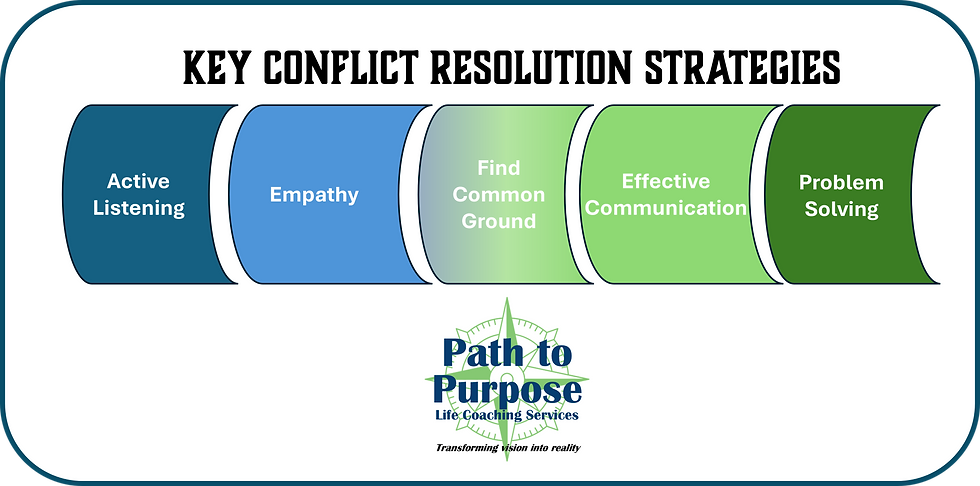Mastering Conflict Resolution Skills for Effective Communication
- Julia Bruce
- Sep 22, 2025
- 4 min read
Conflict is a natural part of human interaction. Whether in families, neighborhoods, or workplaces, disagreements often arise from differing opinions and misunderstandings. However, the ability to handle these situations skillfully is a skill that anyone can learn. This blog post will highlight the importance of conflict resolution skills, offer practical strategies for improvement, and explain how mastering these abilities can lead to more effective communication.
Understanding Conflict Resolution
Conflict resolution includes the methods and processes that help end conflict peacefully. It involves various techniques that enable individuals to manage disagreements constructively. Understanding the nature of conflict is crucial for effective resolution.
Conflicts typically fall into two categories: constructive and destructive. Constructive conflicts can promote growth and understanding, leading to stronger relationships. For example, a 2018 study found that teams that engage in constructive conflict are 25% more innovative than those that do not. However, destructive conflicts can result in resentment and breakdowns in communication. Recognizing the type of conflict is essential for deciding the best approach to resolve it.
The Importance of Conflict Resolution Skills
Developing conflict resolution skills is vital for several reasons:
Improved Relationships: Effective conflict resolution fosters healthier relationships. When people feel heard and respected, they are more likely to build trust and cooperation. For instance, couples who communicate effectively during disagreements report a 50% increase in relationship satisfaction.
Enhanced Communication: Mastering these skills leads to clearer communication. Individuals learn to express their thoughts without making tensions worse.
Increased Productivity: In workplaces, unresolved conflicts can reduce productivity. According to the American Management Association, 85% of employees face conflict at work, costing U.S. companies $359 billion annually in lost productivity. Timely conflict resolution helps teams maintain focus.
Personal Growth: Handling conflicts develops emotional management, patience, and problem-solving abilities. Learning to navigate tough conversations prepares individuals for future challenges.
Conflict Prevention: By refining conflict resolution skills, individuals can spot potential issues early and address them before they worsen.
Key Conflict Resolution Strategies
Active Listening
Active listening is a core skill in conflict resolution. It means fully engaging with what the other person is saying and responding thoughtfully. Here are some effective active listening techniques:
Maintain Eye Contact: This signals to the speaker that you are interested in their message.
Avoid Interrupting: Let the speaker finish their thoughts. This shows respect and helps clarify their viewpoints.
Paraphrase and Reflect: Summarize what the speaker has said to confirm understanding. This demonstrates you are paying attention.
Ask Open-Ended Questions: Encourage the speaker to elaborate by using questions that invite more than a yes or no answer.
Empathy
Empathy is key to understanding and sharing others' feelings. It helps individuals approach conflict from a compassionate perspective. To develop empathy:
Put Yourself in Their Shoes: Consider the feelings and motivations behind the other person's actions.
Acknowledge Their Feelings: Recognize the other person's feelings, even if you disagree. This respect can diffuse tension.
Express Compassion: Show genuine interest in the other person's experience and a willingness to create a resolution together.
Finding Common Ground
Often, people focus on differences instead of similarities. Finding common ground helps to bridge gaps between viewpoints. Here are strategies to identify areas of agreement:
Identify Shared Goals: Discuss the end goals that both parties agree on to shift the conversation from confrontation to collaboration.
Highlight Similar Values: Bring up shared values to foster a sense of unity.
Collaborate on Solutions: Work together to find solutions that address both parties' needs, strengthening the relationship.
Effective Communication
Clear and respectful communication is essential in resolving conflicts. Consider these tips during disagreements:
Use "I" Statements: State your feelings with "I" statements to avoid sounding accusatory. For example, say "I feel overwhelmed when…" instead of "You always…"
Stay Calm: Control your emotions to prevent escalating tensions. Taking a moment to breathe can help maintain clarity.
Be Respectful: Avoid name-calling or aggressive language. Respectful communication fosters productive dialogue.
Problem-Solving
After sharing perspectives, it's time for collaborative problem-solving. Here’s a simplified approach:
Define the Problem: Clearly identify the issue to ensure mutual understanding.
Generate Options: Brainstorm potential solutions without judgment to encourage creativity.
Evaluate Options: Discuss the advantages and disadvantages of each solution while considering both parties' needs.
Agree on a Solution: Once a resolution is identified, ensure that both parties are committed to it and recognize their roles in implementation.
Follow Up: After reaching a resolution, check in periodically to ensure the solution is effective and to address any lingering concerns.

Practicing Conflict Resolution Skills
Like any skill, conflict resolution requires ongoing practice. Here are ways to refine these abilities:
Role-Playing: Practice conflict scenarios through role-playing with friends or colleagues. This builds confidence.
Seek Feedback: After resolving a conflict, ask for feedback to gain insights into the process.
Reflect on Past Conflicts: Analyze previous disagreements to identify successful strategies and areas for improvement.
Attend Workshops: Participate in training sessions focused on conflict resolution. These experiences can provide valuable tools.
Navigating Conflict for Better Communication
Mastering conflict resolution skills is crucial for effective communication and healthy relationships. By honing skills such as active listening, empathy, and problem-solving, individuals can engage constructively in conflicts and promote a more positive environment. Remember, conflict isn't inherently negative; it can be an opportunity for growth and understanding. With practice, anyone can become skilled in conflict resolution, leading to healthier interactions in every area of life.




Comments